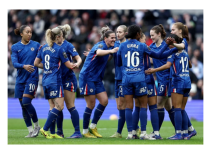Nigeria’s buzzing fitness scene is facing a culture clash, as top celebrities and influencers call for more modesty in gyms nationwide.
What began as casual social media commentary has now evolved into a heated public debate over what’s appropriate to wear while working out.
As gym memberships surge and activewear trends flood the market, workout spaces have increasingly become fashion showcases — but not everyone is cheering the evolution.
Former Big Brother Naija star Teddy A sparked the controversy in April 2025 after warning that some gym outfits had become “too revealing.”
“Please try to cover your bum before coming into the gym,” he said in a viral Instagram video. “If this continues, gyms might start banning women.”
Actor and comedian Williams Uchemba added fuel to the fire, revealing he quit public gyms altogether because he found the clothing “appalling.” “I couldn’t concentrate. I now work out at home — less distraction, more peace,” he said.
Music promoter Yhemo Lee joined the conversation from another angle — calling out men who wear excessively tight shorts and leggings.
“It’s not just about women. Some guys need to dress better too,” he posted.
Fashion or Function?
Once dominated by tracksuits and sweatbands, Nigerian gym fashion now mirrors global fitness trends — crop tops, leggings, biker shorts, and mesh sets dominate the scene.
But while many see it as a sign of modern expression, others believe it’s eroding gym etiquette.
Three key issues stand out:
Appropriateness: Gyms, critics say, should remain spaces for fitness, not fashion parades.
Double Standards: Women often bear the brunt of criticism, even though male outfits can also be provocative.
Expression vs. Etiquette: The argument pits freedom of self-expression against social decency and respect for shared spaces.
This debate reflects broader questions about modern Nigerian society — where global fashion trends collide with traditional values.
Some fitness experts warn that turning gym attire into a moral issue could discourage newcomers — especially women — from joining fitness programs. Others argue that enforcing modesty could help reduce discomfort and distractions in mixed-gender gyms.
Meanwhile, brands and influencers continue to push trendy activewear lines online, blurring the line between workout gear and fashion statement.
Policy or Politeness? Will gym owners eventually introduce dress codes to maintain decorum?
Industry Response: Can Nigerian sportswear brands design pieces that blend modesty, comfort, and style?
Cultural Balance: How will Nigerians navigate the line between body confidence and social norms in fitness spaces?
As Nigeria’s fitness culture expands, the debate highlights a nation negotiating between confidence and conservatism. Whether in crop tops or covered tees, one thing remains clear — the conversation about how to dress for progress isn’t ending anytime soon.
































